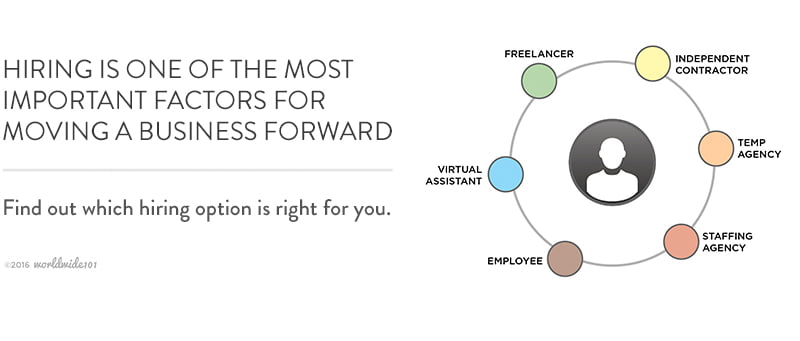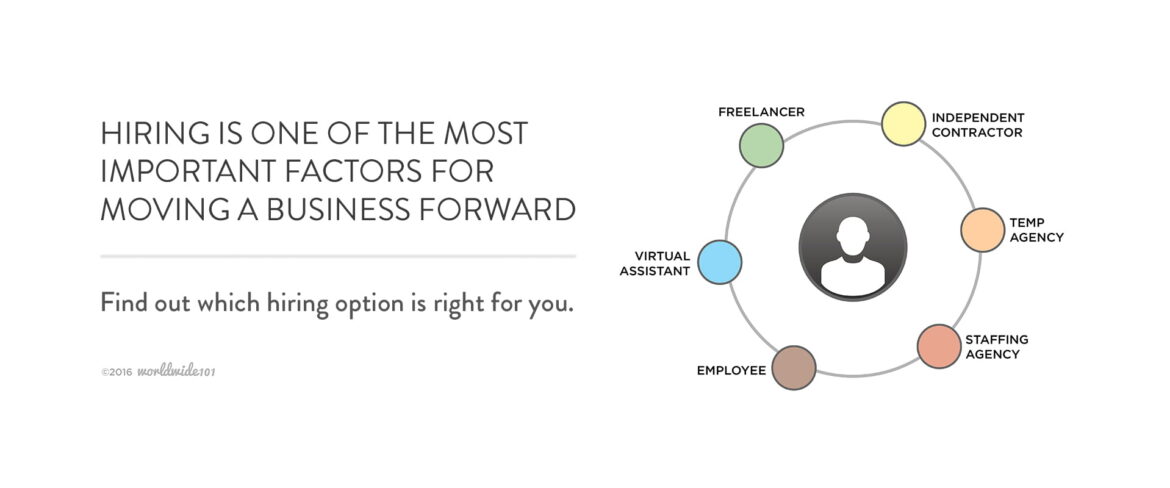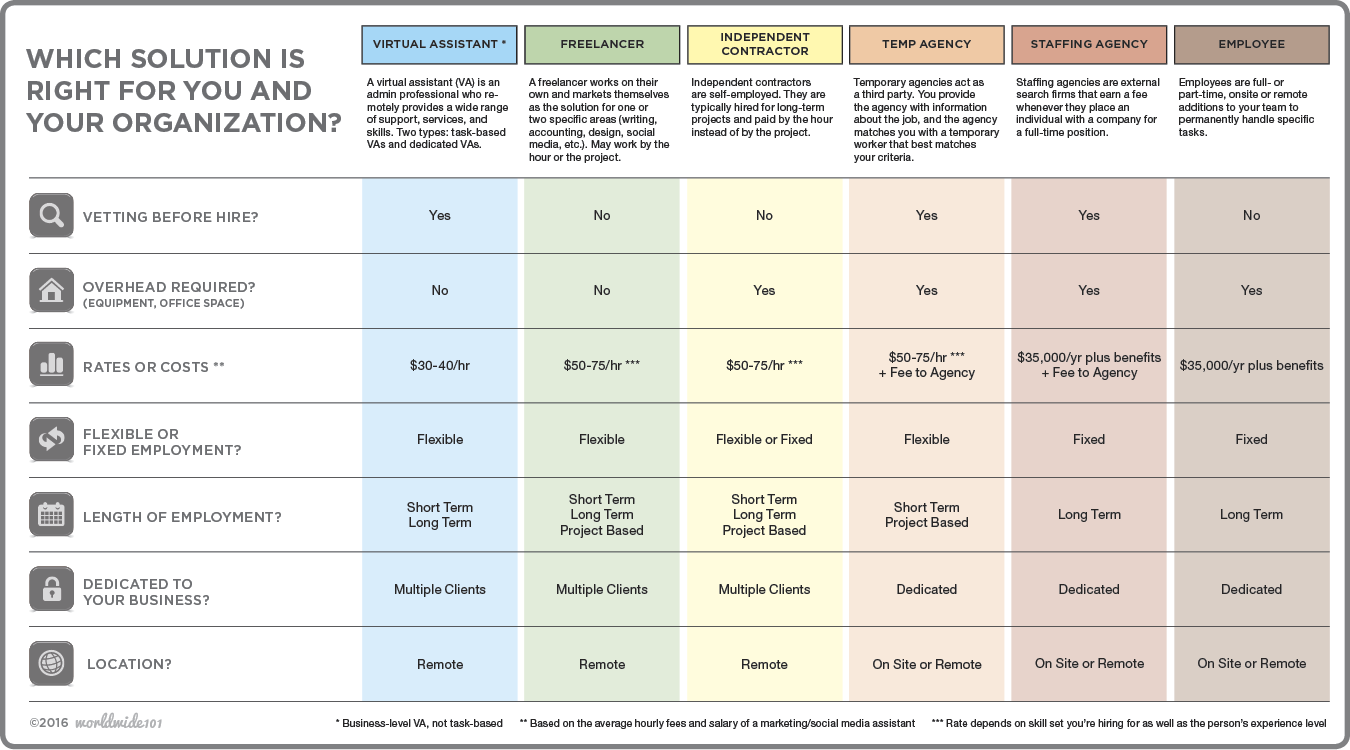

Whether you are a small-business owner or an executive in a larger business, the responsibility of moving your business forward—sustaining its growth, keeping up with technological advances, social media trends, managing the implementation of key projects—rests on your shoulders.
Accomplishing all these tasks can feel overwhelming and, without the right help, impossible. But it doesn’t have to.
Virtual assistants, freelancers, independent contractors, temp agencies, staffing agencies, and full- and part-time employees all offer the help you need to lessen your workload and move your business forward. We know the process of deciding which solution is right for you can seem daunting.
Here, we’ve broken down what each option entails, including the cost-effectiveness, advantages and disadvantages, risks, and flexibility of each option.
First: Choose Flexible vs. Fixed
Flexible
Virtual assistants, freelancers, temps, and contractors are flexible in regards to their length of employment (they can be project based, short-term, or long-term) and number of hours. As the business owner or hiring manager, you can determine how many hours you need help, when you need the help, and hire accordingly.
Fixed
Employees, whether hired through a staffing agency or on your own, are fixed and involve a commitment: when you hire someone, you do so with permanency in mind – this person will be with you and your business for the long term – and you have a set number of hours of work for that person to do each day.
A note about risk: When you choose a fixed employment situation (you’re hiring someone permanently), you take a bigger risk in regards to time, effort, and money spent. There is a financial cost, and a possible morale cost, if the employee doesn’t work out. With the flexible employment situation, you can certainly lose time and money if someone doesn’t work out, but you can quickly replace that person. And, some agencies that offer flexible employment options offer a guarantee.
Second: Choose Type of Employment
Virtual Assistant Agency
Type of employment
Flexible
Who they are
A virtual assistant, or VA, is an administrative professional who remotely provides a wide range of support, services, and skills. There are two main types of VAs: task-based VAs and dedicated VAs.
Task-based VAs specialize in just one or two areas, such as basic administrative tasks or social media services. Tasks are performed by a pool of assistants.
Dedicated VAs range from providing basic admin support to premium ‘business-grade’ services which allow you to delegate advanced tasks. They are equipped to tackle an array of responsibilities, including administrative, marketing and social media, project management, customer service, and multilingual, design, and bookkeeping services. A dedicated VA means that you will work with the same person consistently and can integrate them into your business.
VAs operate either onshore or off-shore, and pricing and quality levels vary accordingly.
Benefits
Working with a virtual assistant company will expedite the process of getting up and running with your new resource. VAs are vetted and trained by their representative company, can be tailored to fit your specific needs (work hours, responsibilities, communication channels), and involve no overhead costs. Dedicated VAs can be chosen to match your personality and business style. If necessary, the VA’s representative company will match you with a new assistant if the current one isn’t the best fit.
Cost
VAs work on an as-needed basis, there are no overhead costs, and you pay only for work that is completed. The rate for any VA will depend on the number of hours you need them and the tasks they are assigned. Rates for task-based VAs are lower than those of dedicated VAs, due to their limited offerings. Dedicated business-level VAs typically charge around $30-40/hour, due to their more advanced skillset.
Disadvantages
VAs work remotely, so if you communicate best in person, it might not be the best fit. Most VAs have multiple clients, meaning their available work hours may be limited.
Freelancer
Type of employment
Flexible
Who they are
A freelancer is someone who works on their own and markets themselves as the solution for one or two specific areas (writing, accounting, design, social media, etc.). They typically have multiple clients at once and are most often hired to do short-term projects no one else in a business is equipped to do, or has time to do.
Benefits
Provide specific skills to help fill in an area of your business that is wanting, or do a project that no one else is equipped to do. Work on a per-project or per-hour basis, giving you flexibility in hiring. Since they work remotely, there are no overhead costs.
Cost
Freelancers set their own rates based on their experience and their skillset. Rates vary widely based on service provided, overhead costs, years of experience, and the length of the contract. They may charge by the hour or by the project.
Disadvantages
You are responsible for all the vetting, either via referral or your own research. Freelancers have unpredictable rates, varying by who you contact and what their going rate is, and have multiple clients. There is no guarantee, so if one doesn’t work out, you are also responsible for finding a different freelancer.
Independent Contractor
Type of employment
Flexible or fixed, depending on contract
Who they are
Independent contractors are self-employed and typically have their own business. When working with a contractor, the most important thing to keep in mind is that they have the right to dictate what and how an assignment is completed; you only have the right to direct the result. (According to the IRS, if someone performs work for you, and you control what and how it will be done, that individual is legally considered your employee.) Independent contractors are typically hired for long-term projects and are paid by the hour instead of by the project.
Benefits
Can be onsite or off, based on your preference. They have their own equipment and are experts in their field, giving them insights that could be valuable to your business.
Cost
Varies widely, based on hourly rates, overhead costs, years of experience, and the length of the contract.
Disadvantages
It is legally complicated to differentiate between an independent contractor and an employee; the IRS states that there is no clear determination between the two. Misclassifying an employee as a contractor, or vice versa, can lead to being held liable for employment taxes. Contractors typically demand more creative control and higher rates. You are responsible for seeking out, vetting, and hiring the contractor, and replacing that person if he or she doesn’t work out.
Temporary Agency
Type of employment
Flexible
Who they are
Temporary (temp) agencies act as a third party between you and the employee. You provide the agency with information about the job, and the agency matches you with a temporary worker that best matches your criteria.
Benefits
The agency does the vetting (finding, interviewing, background checks, hiring) for you. If the employee doesn’t work out, you can request a different person. Temp workers typically operate on-site, which can be an advantage or disadvantage, depending on your circumstances and preferences.
Cost
The temp agency pays the workers, and you pay the agency that person’s wages plus a fee to the agency. Additional costs include training, equipment and office space (if on-site), and paying the worker for nonproductive time.
Disadvantages
When you hire a new person to join your team in the office, possible personality and morale issues can crop up between temporary and full-time employees. There is no guarantee that the temp will be a good fit, and it’s a short-term hire, so if you’re interested in consistency, a temporary worker may not be right for you.
Staffing Agency
Type of employment
Fixed
Who they are
Staffing agencies are external search firms that earn a fee whenever they place an individual with a company for a full-time position. You tell the agency the number of workers you need, the time period for which you need them, and your hourly rate or salary. The agency then reviews the resumes they have on file, conducts background and other such screenings, and interviews the individuals for you.
Benefits
The agency does the work of recruiting, interviewing, and vetting the person, then you make the ultimate decision about hiring the employee, saving you time and, possibly, money.
Cost
You pay the agency a fee for finding you an employee. Upon hiring, you are responsible for the employee’s benefits, salary, equipment, training, and other such costs.
Disadvantages
If the agency is not well-versed in your corporate culture, they may hire an individual who is capable of doing the job, but who doesn’t fit your business’s personality. It is costly to hire a full-time employee, and the long-term commitment to one individual means not having the option to replace them with a better fit if needed, without the hassle of firing and rehiring.
Hiring an Employee Directly
Type of employment
Fixed
Who they are
Employees are full- or part-time, onsite or remote additions to your team. Hiring an employee means you have enough consistent work, and the revenue to support them, that you need someone to permanently take over those tasks.
Benefits
You can hire someone who fits well with your personality and corporate culture, can grow and develop alongside the company, and will be more invested in the outcome of the business. This is more of a relationship than a business transaction.
Cost
Employees are paid for his or her time, regardless of whether or not it is productive. You pay for training, benefits, equipment, salary, and other such costs—including emotional investment.
Disadvantages
It takes time to advertise, interview, and hire for a position. There are also more risks involved due to an employee’s permanency and the access they’ll have to all aspects of the business.
Third: Make Your Decision
Here are the steps to take to find your ideal staffing solution:
Step 1. Identify the workload
What tasks will the person be responsible for? How much time will you need them to work a week?
Less than 40 hours = VA, freelancer, contractor, temp, or part-time employee
40+ hours = full-time employee, staffing agency, temp agency, or contractor
Step 2. Identify the skillset needed
How much experience should they have? Do you want to be able to grow the position or have it be a specific task-oriented job? Consider writing a job description with required and preferred qualifications.
Qualifications and experience level will determine the hourly or salaried rate
Step 3. Identify the time frame
Do you need the person for a specific period of time, or would you like to have them indefinitely?
Project-based = Freelancer, contractor, temp
Short-term = VA, freelancer, contractor, temp
Long-term = freelancer, contractor, staffing agency, employee
Step 4. Decide on remote or on site
Do you want the staff member to report to you in person or remotely? (On site requires space in your office, computer, phone line, Internet, and other office software and hardware)
Yes = Contractor, Temp, Staffing Agency, Employee
No = VA, freelancer, contractor
Step 5. Decide on commitment level
Do you want someone dedicated to you and your business? Or are you comfortable with the person having multiple clients?
Dedicated = Contractor, Temp, Staffing Agency, Employee
Multiple = VA, freelancer, contractor
After you’ve gone through steps 1 – 5, you will be able to determine which type of hiring option is right for you and your organization.
Example: Searching for a social media assistant
Imagine you’re a small-business owner looking to grow your social media presence. You calculate that you’ll need someone 15 hours a week to manage posts on an array of channels. You’re looking for someone with social media and marketing experience who writes well, has project management skills, is organized, and can meet strict deadlines.
Since the job is all online, you’re looking for someone to work remotely. This narrows your options to flexible employment: a virtual assistant, freelancer, independent contractor, or temp worker. Because this is a permanent position that could grow in the future, it wouldn’t make sense to hire a freelancer or temp worker, as they are hired according to a set time frame and/or specific project. A business-level VA, on the other hand, will give you the flexibility to start at 15 hours a week, find someone well-suited to your needs, and have the option to increase the number of hours they work per week in the future, if necessary.
___
Every business has a unique set of needs, and therefore requires a special team of people to make it function as smoothly as possible. Anyone you hire will need training to familiarize themselves with your particular business’s needs, the industry, your work culture, and your personal work style. Choosing the best fit for you, be it a virtual assistant, freelancer, independent contractor, temp agency, staffing agency, or employee, is a big decision, but can be the key to unlocking your business’s full potential.
Topic: Remote Staffing





